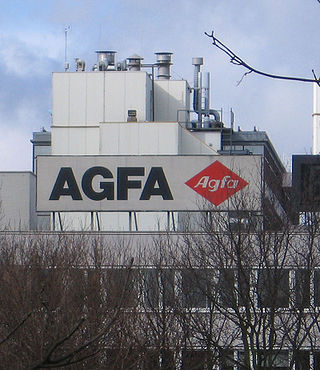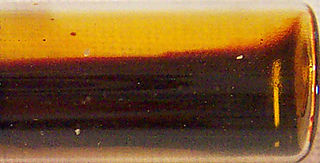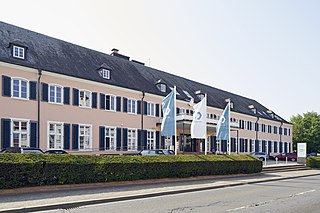
Indigo dye is an organic compound with a distinctive blue color. Indigo is a natural dye extracted from the leaves of some plants of the Indigofera genus, in particular Indigofera tinctoria; dye-bearing Indigofera plants were commonly grown and used throughout the world, in Asia in particular, as an important crop, with the production of indigo dyestuff economically important due to the historical rarity of other blue dyestuffs

I. G. Farbenindustrie AG, commonly known as IG Farben, was a German chemical and pharmaceutical conglomerate. Formed in 1925 from a merger of six chemical companies—BASF, Bayer, Hoechst, Agfa, Chemische Fabrik Griesheim-Elektron, and Chemische Fabrik vorm. Weiler Ter Meer—it was seized by the Allies after World War II and divided back into its constituent companies.

Agfa-Gevaert N.V. (Agfa) is a Belgian-German multinational corporation that develops, manufactures, and distributes analogue and digital imaging products, software, and systems.

BASF SE, an acronym for a its original name Badische Anilin und Sodafabrik, is a European multinational company and the largest chemical producer in the world. Its headquarters are located in Ludwigshafen, Germany.

Hoechst AG was a German chemicals then life-sciences company that became Aventis Deutschland after its merger with France's Rhône-Poulenc S.A. in 1999. With the new company's 2004 merger with Sanofi-Synthélabo, it became a subsidiary of the resulting Sanofi-Aventis pharmaceuticals group.

Celanese Corporation, formerly known as Hoechst Celanese, is an American technology and specialty materials company headquartered in Irving, Texas. A Fortune 500 corporation, the company is the world’s leading producer of acetic acid, producing about 1.95 million tonnes per year, representing approximately 25% of global production. Celanese is also the world's largest producer of vinyl acetate monomer (VAM).

Ciba was a chemical company based in and near Basel, Switzerland. "Ciba" stood for "Chemische Industrie Basel". It was formed when the non-pharmaceuticals elements of Novartis were spun out in 1997, following the merger in the previous year of Ciba-Geigy and Sandoz that created Novartis.
The American IG Chemical Corporation, or American IG for short, was an American holding company incorporated under the Delaware General Corporation Law in April 1929 and headquartered in New York City. It had stakes in General Aniline Works (GAW), Agfa-Ansco Corporation, and Winthrop Chemical Company, among others, and was engaged in manufacture and sale of pharmaceuticals, photographic products, light weight metals, synthetic gasoline, synthetic rubber, dyes, fertilizers, and insecticides. The Moody's industrial manual listed an affiliation between IG Farben and American IG at the time of founding. First, Hermann Schmitz, who was the second after Carl Bosch in IG Farben's hierarchy, and then his brother, Dietrich A. Schmitz, served as American IG's presidents. It was re-incorporated as General Aniline & Film (GAF) Corp. in 1939 after a merger with General Aniline Works.

The Aditya Birla Group (ABG) is an Indian multinational Fortune 500 company headquartered in Mumbai, Maharashtra. The group has a presence in 36 nations. As of 2023 the company is worth $60 billion and derives over 50% of its revenue from its global operations.
INEOS Group Limited is a British multinational chemicals company headquartered and registered in London. As of 2021, it is the fourth largest chemical company in the world.

Albemarle Corporation is an American specialty chemicals manufacturing company based in Charlotte, North Carolina. It operates 3 divisions: lithium, bromine specialties and catalysts.
Clariant AG is a Swiss multinational speciality chemicals company, formed in 1995 as a spin-off from Sandoz. The company conducts its business through three business units: care chemicals; catalysts; adsorbents & additives. Headquartered in Muttenz, Switzerland, the public company encompasses 74 subsidiaries in 36 countries (2022). Major manufacturing sites are located in Europe, North America, South America, China, and India. In 2022, sales from continuing operations were 5.198 billion CHF.

Engelhard Corporation was an American Fortune 500 company headquartered in Iselin, New Jersey, United States. It is credited with developing the first production catalytic converter. In 2006, the German chemical manufacturer BASF bought Engelhard for US$5 billion.

SGL Carbon SE is a European company based in Germany. It is one of the world's leading manufacturers of products from carbon.

Grasim Industries Limited is an Indian manufacturing company based in Mumbai. Since its inception in 1947 as a textile manufacturer, Grasim has diversified into textile raw materials like viscose staple fiber (VSF) and viscose filament yarn, chemicals and insulators, along with cement and financial services through its subsidiaries UltraTech Cement and Aditya Birla Capital respectively. The company is a part of the Aditya Birla Group.
Basell Polyolefins was a joint venture between BASF and Royal Dutch Shell. Leonard Blavatnik's Access Industries acquired it from the venturers for $5.7 billion in August 2005. In 2007, Basell merged with the privately owned US company Lyondell Chemical Company to form LyondellBasell, which went bankrupt in the US in January 2009, and emerged from bankruptcy in April 2010.

Cassella AG, formerly Leopold Cassella & Co. and Cassella Farbwerke Mainkur AG, commonly known as Cassella, was a German chemical and pharmaceutical company with headquarters in Frankfurt am Main. Founded in 1798, in the Frankfurt Jewish Alley by Leopold Cassella, Cassella operated as an independent company until 1995, and was one of many predecessor companies of today's Sanofi. Its main products were dyes, drugs, cosmetics and various other chemical products. From 1949, Cassella focused increasingly on pharmaceuticals and cosmetics rather than its former primary focus, dyes. Much of its history is closely associated with the Gans family, a prominent family of industrialists and philanthropists and former owners of Cassella.

Kornit Digital is an Israeli-American international manufacturing company. It produces high-speed industrial inkjet printers, and pigmented ink and chemical products for the garment and apparel, home goods, and textile accessories decorating industry. Kornit Digital has offices in Israel, Hong Kong, China, Germany and the USA. Ofer Ben Zur was Kornit CEO from its founding in 2002 until 2014, when he was succeeded by Gabi Seligsohn; Ben Zur remained as Chief Technology Officer. Ronen Samuel, formerly of HP Indigo, succeeded Seligsohn as CEO in June of 2018.

Kureha Corporation is a Japanese manufacturer of specialty chemicals, polymers and agrichemicals.

We aRe SpinDye is a Swedish fashion tech company that has developed a sustainable coloring method for synthetic textiles which reduces the environmental impact compared to the traditional dyeing process. The company was founded in 2014. Headquartered in Stockholm, Sweden, We are Spindye has since it hit the market had collabs with brands such as Quiksilver, Peak Performance, Bergans of Norway, Roxy and Fjällräven.
















